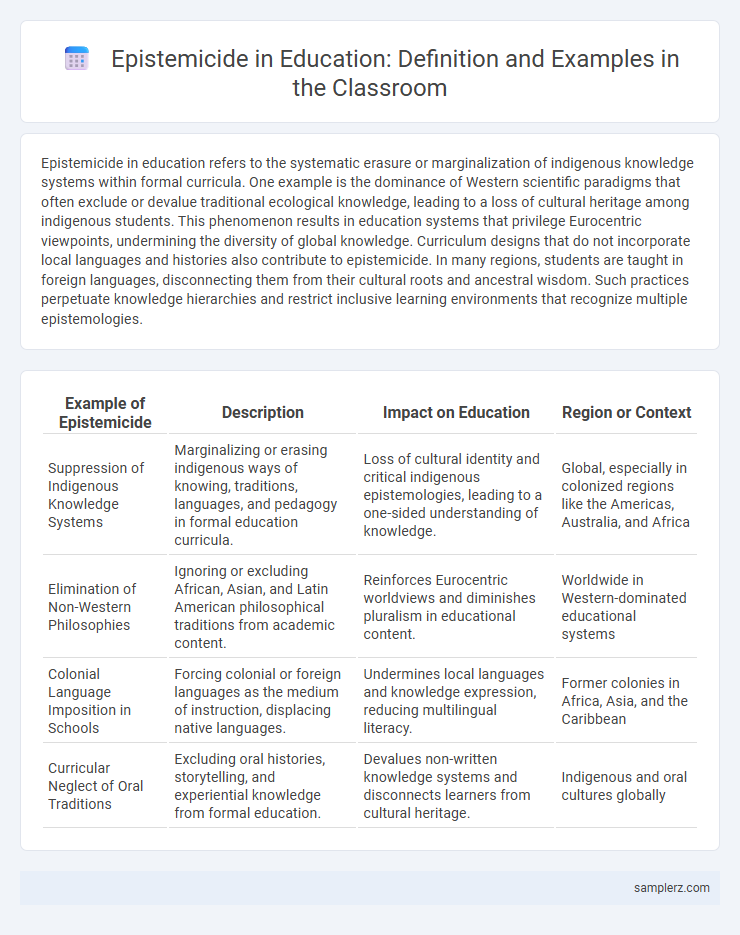Epistemicide in education refers to the systematic erasure or marginalization of indigenous knowledge systems within formal curricula. One example is the dominance of Western scientific paradigms that often exclude or devalue traditional ecological knowledge, leading to a loss of cultural heritage among indigenous students. This phenomenon results in education systems that privilege Eurocentric viewpoints, undermining the diversity of global knowledge. Curriculum designs that do not incorporate local languages and histories also contribute to epistemicide. In many regions, students are taught in foreign languages, disconnecting them from their cultural roots and ancestral wisdom. Such practices perpetuate knowledge hierarchies and restrict inclusive learning environments that recognize multiple epistemologies.
Table of Comparison
| Example of Epistemicide | Description | Impact on Education | Region or Context |
|---|---|---|---|
| Suppression of Indigenous Knowledge Systems | Marginalizing or erasing indigenous ways of knowing, traditions, languages, and pedagogy in formal education curricula. | Loss of cultural identity and critical indigenous epistemologies, leading to a one-sided understanding of knowledge. | Global, especially in colonized regions like the Americas, Australia, and Africa |
| Elimination of Non-Western Philosophies | Ignoring or excluding African, Asian, and Latin American philosophical traditions from academic content. | Reinforces Eurocentric worldviews and diminishes pluralism in educational content. | Worldwide in Western-dominated educational systems |
| Colonial Language Imposition in Schools | Forcing colonial or foreign languages as the medium of instruction, displacing native languages. | Undermines local languages and knowledge expression, reducing multilingual literacy. | Former colonies in Africa, Asia, and the Caribbean |
| Curricular Neglect of Oral Traditions | Excluding oral histories, storytelling, and experiential knowledge from formal education. | Devalues non-written knowledge systems and disconnects learners from cultural heritage. | Indigenous and oral cultures globally |
Understanding Epistemicide in Educational Contexts
Epistemicide in education manifests when dominant knowledge systems marginalize or erase indigenous and local ways of knowing, leading to a homogenized curriculum that undervalues diverse epistemologies. This systematic suppression disrupts students' cultural identities and critical thinking by privileging Western-centric perspectives over pluralistic knowledge. Recognizing epistemicide necessitates integrating multiple epistemologies to foster equitable, inclusive, and culturally responsive educational practices.
Colonial Curricula and the Marginalization of Indigenous Knowledge
Colonial curricula in education systems often prioritize Western knowledge frameworks, systematically marginalizing Indigenous knowledge and epistemologies. This epistemicide perpetuates a hierarchy where Indigenous ways of knowing are devalued or erased, limiting cultural diversity and critical understanding in academic settings. Efforts to decolonize education emphasize the integration of Indigenous knowledge to restore epistemic justice and promote more inclusive learning environments.
The Suppression of Local Languages in Classrooms
The suppression of local languages in classrooms exemplifies epistemicide by erasing indigenous knowledge systems and cultural identities. This practice prioritizes dominant languages, often leading to the marginalization of students' native tongues and limiting their cognitive and cultural development. Such language policies diminish the diversity of knowledge transmission and contribute to the loss of valuable linguistic heritage within education systems.
Western-Centric Textbooks and the Erasure of Diverse Histories
Western-centric textbooks often marginalize Indigenous knowledge systems, leading to epistemicide by erasing diverse cultural perspectives and histories from the curriculum. This practice reinforces a singular worldview that undervalues non-Western epistemologies and limits students' understanding of global knowledge diversity. Such educational frameworks contribute to the systematic exclusion of marginalized voices, perpetuating knowledge inequality in academic institutions worldwide.
Exclusion of Non-Western Philosophies in School Syllabi
Exclusion of non-Western philosophies in school syllabi exemplifies epistemicide by systematically erasing diverse knowledge systems from educational narratives. This practice reinforces Western epistemic dominance and marginalizes indigenous and global intellectual traditions, limiting students' exposure to a pluralistic worldview. Incorporating non-Western philosophies enriches critical thinking and fosters cultural inclusivity within curricula.
The Impact of Standardized Testing on Cultural Knowledge
Standardized testing often marginalizes diverse cultural knowledge by prioritizing dominant narratives and knowledge systems, resulting in epistemicide within education. Indigenous languages, histories, and ways of knowing are frequently excluded from curricula, leading to a loss of cultural identity and intellectual diversity among students. This systemic bias undermines educational equity and hinders the preservation of marginalized epistemologies.
Teacher Training Programs and Epistemological Bias
Teacher training programs often perpetuate epistemological bias by prioritizing Western knowledge systems while marginalizing indigenous and non-Western epistemologies, leading to epistemicide in education. This selective validation of knowledge undermines diverse ways of knowing and limits critical perspectives within educational curricula. Reforming teacher education to include pluralistic epistemologies can counteract the erasure of alternative knowledge systems and promote educational equity.
Neglecting Oral Traditions in Modern Education
Neglecting oral traditions in modern education exemplifies epistemicide by disregarding indigenous knowledge systems that have been orally transmitted for generations. This exclusion marginalizes diverse cultural perspectives and limits the epistemological richness available to students. Incorporating oral traditions can enhance cognitive diversity and promote inclusive curricula in contemporary educational frameworks.
The Role of Policy in Perpetuating Epistemicide
Education policies often prioritize Western knowledge systems, marginalizing Indigenous and local epistemologies, which leads to epistemicide by erasing diverse ways of knowing. Curriculum frameworks that exclude non-Western perspectives reinforce cultural dominance and limit cognitive diversity among learners. Government mandates and standardization efforts contribute to the systematic undervaluation of alternative epistemic traditions, perpetuating educational inequities.
Reviving Silenced Knowledges: Pathways to Epistemic Justice
Epistemicide in education manifests through the systematic exclusion of Indigenous knowledge systems, such as the erasure of Aboriginal Dreamtime narratives and traditional ecological wisdom from mainstream curricula. Reviving silenced knowledges involves integrating these epistemologies into pedagogical frameworks, fostering epistemic justice by validating diverse ways of knowing. Initiatives like decolonizing education and incorporating community-led storytelling exemplify pathways to restore and honor marginalized intellectual traditions.

example of epistemicide in education Infographic
 samplerz.com
samplerz.com